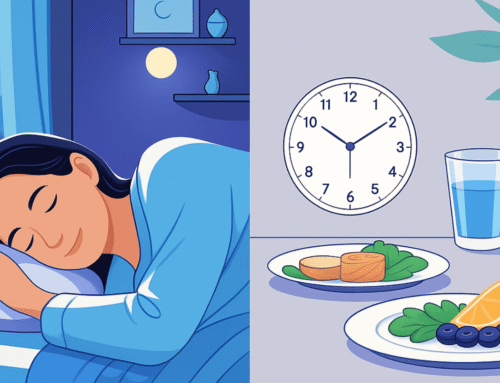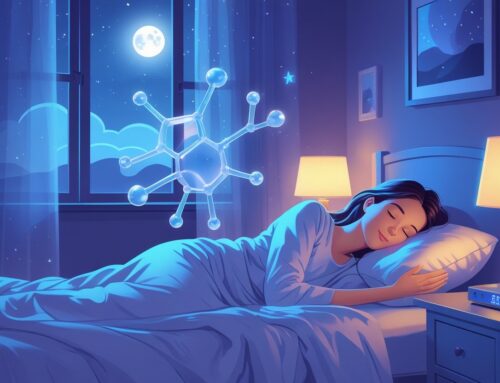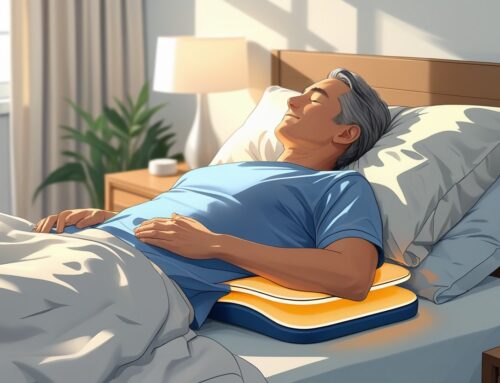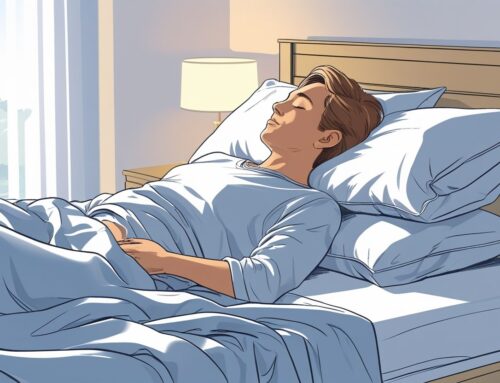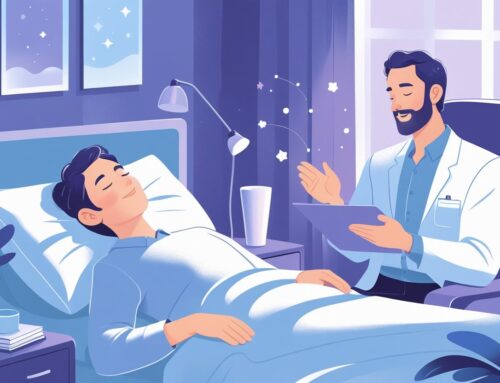Coffee can give a quick boost of energy and help people feel awake, but it can also affect sleep. Caffeine blocks certain chemicals in the brain that signal tiredness. This can make falling asleep harder or reduce sleep quality if coffee is consumed too late in the day. How much someone drinks and when matters for its effect on sleep.
People respond to coffee in different ways. Age, genetics, and caffeine sensitivity play a role. Some can drink an afternoon cup and sleep fine. Others might feel restless at night. Understanding personal reactions helps enjoy coffee without hurting sleep.
Knowing how caffeine stays in the body can guide smarter choices. Drinking coffee earlier or switching to decaf in the evening can protect sleep while still enjoying coffee.
Key Takeaways
- Caffeine can disrupt sleep by blocking sleep signals in the brain.
- Reactions to coffee vary depending on age, genetics, and sensitivity.
- Timing coffee right can help balance alertness and good sleep.
- A supportive and breathable mattress can help offset caffeine’s sleep effects by keeping your body aligned, muscles relaxed, and the bed cooler for easier rest.
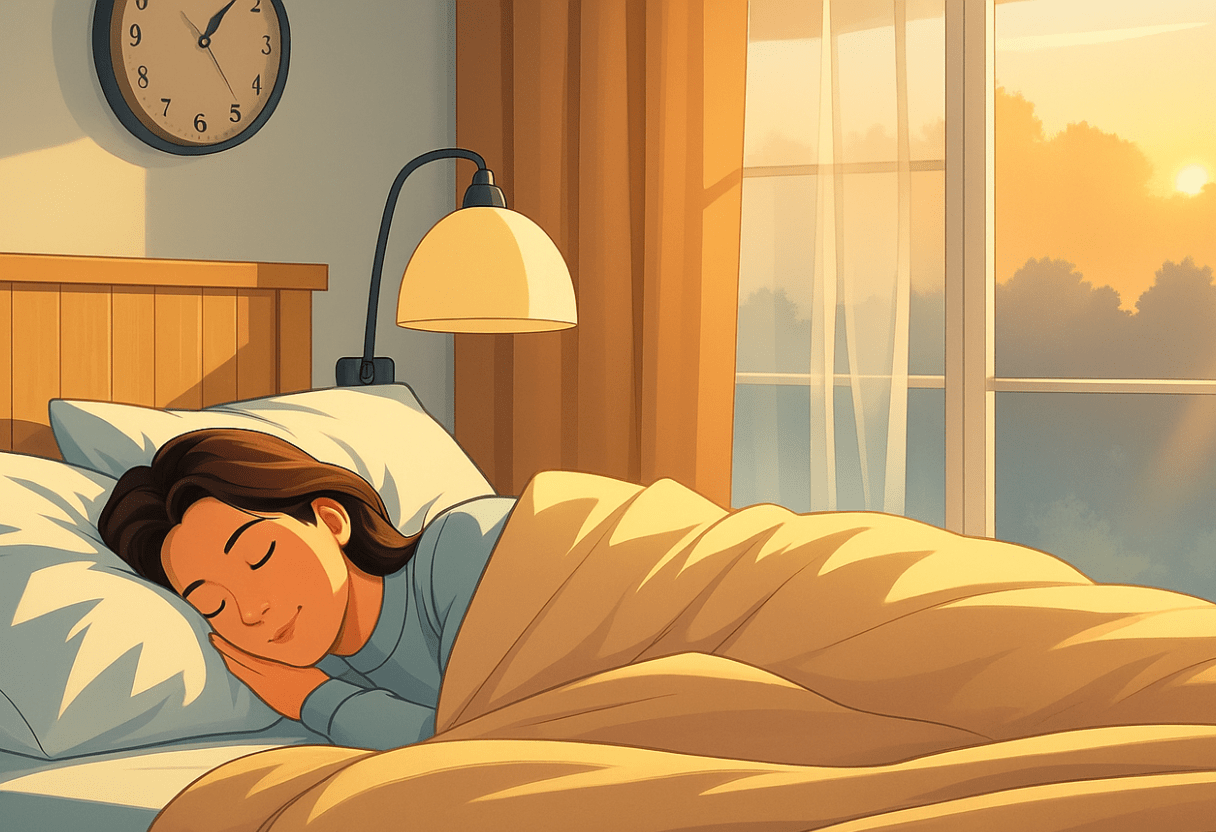
How Coffee Affects Sleep
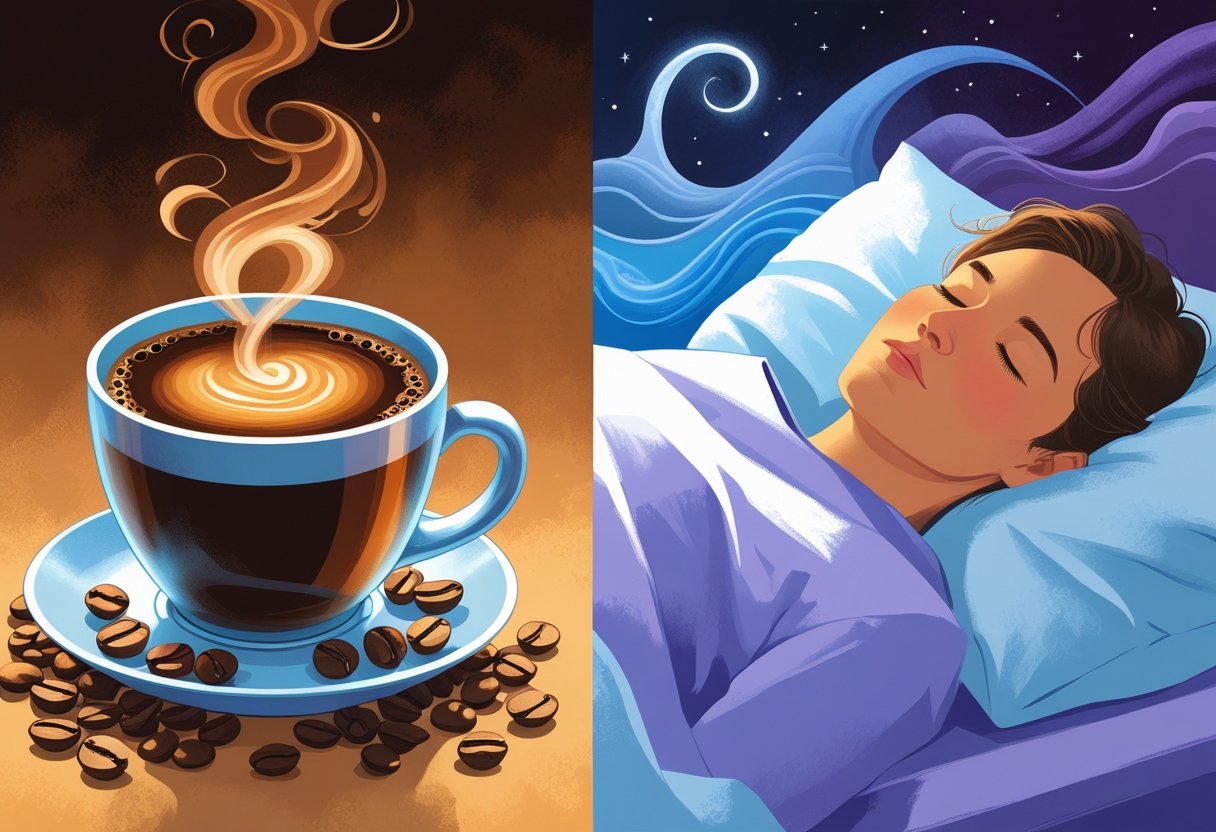
Coffee affects sleep mainly through its caffeine content. Caffeine changes the signals in the brain that tell you you’re tired. It can delay sleep and reduce sleep quality. The time you drink coffee influences how much it affects your rest.
Caffeine and Sleep Physiology
Caffeine works by blocking adenosine in the brain. Adenosine is a chemical that builds up during the day and tells your body it’s time to sleep. When caffeine blocks it, you feel alert and less tired. This doesn’t just make it harder to fall asleep. It can also reduce deep sleep and disturb the sleep cycle, including REM sleep. Deep sleep and REM are both needed to feel fully rested. People respond to caffeine in different ways, so its effect on sleep varies from person to person.
Does Coffee Keep You Awake?
Coffee can keep you awake because caffeine stimulates the central nervous system. It raises alertness and energy levels. Some people develop tolerance, so they notice less effect over time. Even small amounts can affect people who are sensitive. Drinking coffee late in the day can make it harder to fall or stay asleep. Regular coffee drinkers may notice fewer problems because their body adapts.
Timing of Caffeine Intake
The time you drink coffee matters. Caffeine can remain in the body for 3 to 5 hours. Drinking it in the afternoon or evening increases the chance of sleep issues. Experts suggest avoiding caffeine at least 6 hours before bed. Coffee in the morning rarely affects sleep at night. Keeping track of how much and when you drink caffeine can help you rest better.
Understanding Caffeine’s Sleep Disruptions
Caffeine affects the ability to fall asleep and stay asleep, often causing restless nights. It changes the normal structure of sleep stages and can lead to feeling tired the next day despite its stimulant effects. These impacts vary by timing, amount, and individual sensitivity.
Difficulty Falling and Staying Asleep
Caffeine blocks adenosine, a chemical that makes you sleepy. This slows down how quickly you fall asleep, sometimes adding 30 minutes or more. Even drinking caffeine six hours before bed can reduce total sleep time and make sleep less efficient. Staying asleep can be harder too. Caffeine lowers deep sleep, so rest can feel lighter and interruptions happen more easily. People who drink two to four cups of coffee, especially later in the day, report more trouble staying asleep.
Caffeine and Insomnia
Caffeine can trigger or worsen insomnia, especially in people sensitive to stimulants. Insomnia involves trouble falling asleep and waking up multiple times, which caffeine can increase. Even small amounts, like a single cup of coffee or soda, can affect sensitive individuals if taken late in the day. The stimulant effect keeps the brain active and alert, making it hard to wind down.
Impact on Sleep Stages
Caffeine changes the normal flow of sleep stages. It reduces deep sleep and REM sleep, both needed for physical and mental recovery. This shift can move REM sleep earlier in the night and shorten deep sleep later. The overall quality of rest drops, which can reduce alertness and performance the next day.
Daytime Sleepiness After Caffeine
Caffeine can cause tiredness, even though it’s a stimulant. Interfering with nighttime rest builds up sleep debt, leaving people exhausted during the day. Many rely on caffeine to fight this tiredness. This can create a cycle where caffeine temporarily helps but reduces sleep at night, increasing daytime sleepiness and dependence.
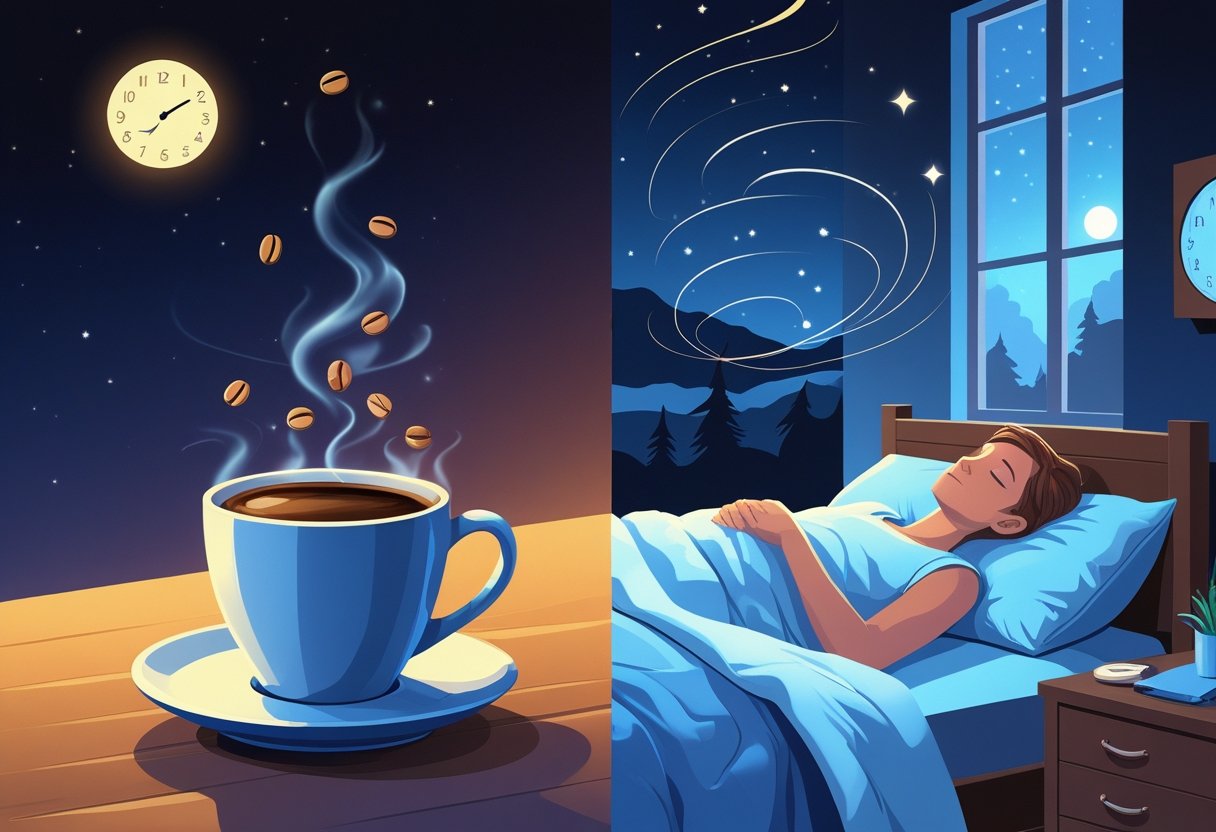
Caffeine Half-Life and Its Lingering Effects
Caffeine stays active in the body long after drinking coffee. Its effects on sleep depend on how the body breaks down caffeine and how long it remains in the bloodstream. This affects how long caffeine can keep someone awake or disrupt sleep.
Caffeine Metabolism
Caffeine enters the bloodstream quickly, usually within 45 minutes after drinking. How fast this happens differs between people and depends on genetics, age, liver health, and lifestyle choices like smoking or certain medications. Because everyone metabolizes caffeine differently, some feel its effects longer. Older adults or those with liver issues process it slower, so it stays in the system longer. People with a faster metabolism usually notice it wears off sooner.
How Long Does Caffeine Affect Sleep?
Caffeine can affect sleep for several hours after it’s consumed. It can make it harder to fall asleep, reduce deep sleep, and increase lighter sleep or waking up at night. This can leave someone feeling less rested the next day. Research shows caffeine can shorten total sleep by around 45 minutes. The amount and timing of caffeine matter. Drinking it close to bedtime has a stronger effect. To avoid sleep issues, it’s best to stop caffeine at least 8 to 14 hours before bed, depending on how much was consumed.
Half Life of Caffeine
Caffeine’s half-life is the time it takes for half of it to leave the bloodstream. For most people, that’s 5 to 7 hours. Even after this time, half of the caffeine is still active in the body. This means an afternoon cup of coffee can still affect sleep many hours later. The half-life can increase with age and is also influenced by factors like pregnancy, medications, and smoking. Knowing how long caffeine stays in the system helps plan when to stop drinking it to protect sleep.
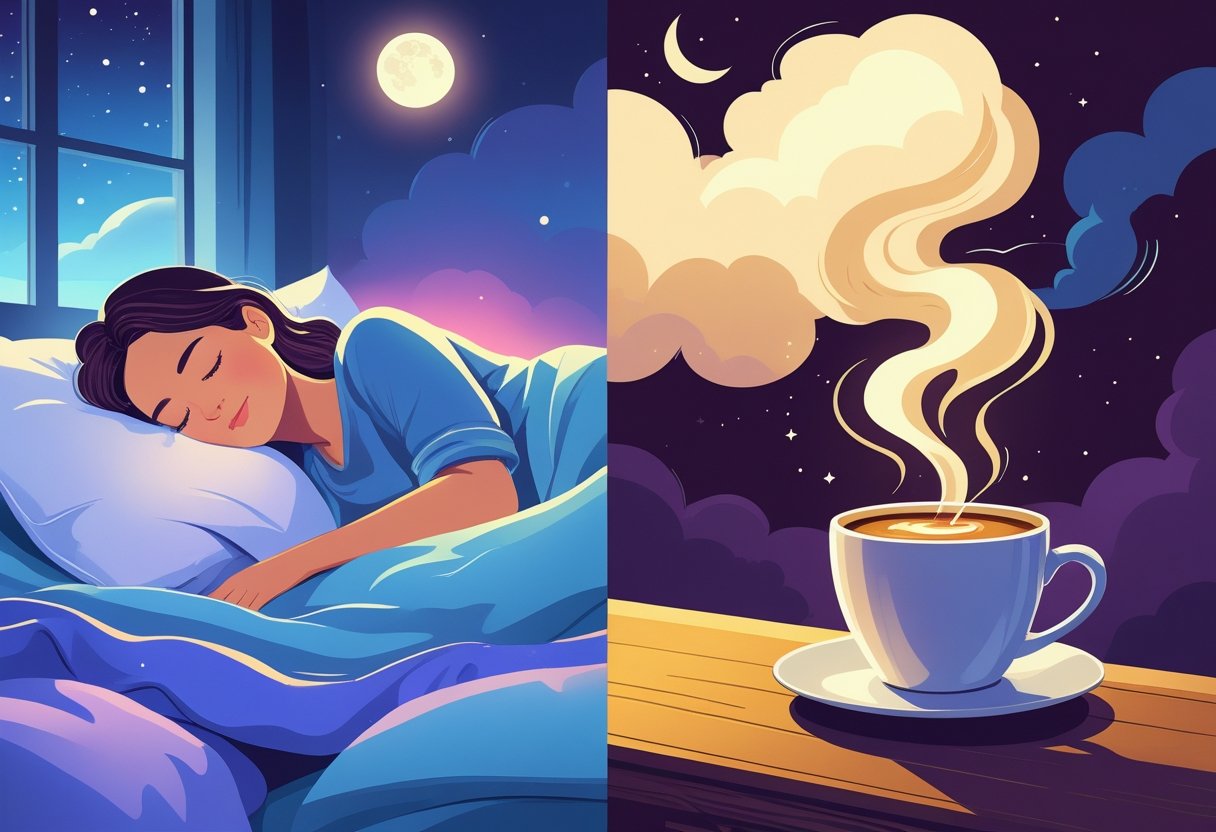
Best Practices for Enjoying Coffee Without Sacrificing Sleep
To avoid sleep problems from caffeine, people need to time their coffee right, control how much they drink, and follow healthy daily habits. This helps keep energy up without causing restlessness at night.
Ideal Times to Stop Consuming Caffeine
Caffeine can stay in the body for up to 12 hours. Experts suggest stopping coffee by noon to avoid trouble falling asleep later. For instance, if someone plans to sleep at 10 p.m., they should have their last coffee at least 10-12 hours before bedtime. Everyone reacts differently. Some people feel fine after a few hours; others stay alert much longer. Cutting caffeine early in the day helps prevent feeling wired when it’s time to sleep.
Moderation and Alternative Choices
Drinking coffee in small amounts limits overstimulation. One or two cups early in the day usually doesn’t cause problems. Drinking too much, especially in the afternoon, can interfere with sleep. If you want a warm drink later, try low-caffeine options like decaf or herbal teas. These give the comfort of a drink without keeping you awake.
Lifestyle and Dietary Recommendations
Sleep is affected by more than just caffeine. Eating your last meal about three hours before bed helps with rest. Skipping alcohol most nights can also improve sleep quality. A bedtime routine helps too. Turning off screens and going to bed around the same time each night supports steady sleep. Including coffee timing in this routine makes it easier to relax and get consistent rest.

Potential Positive and Negative Outcomes
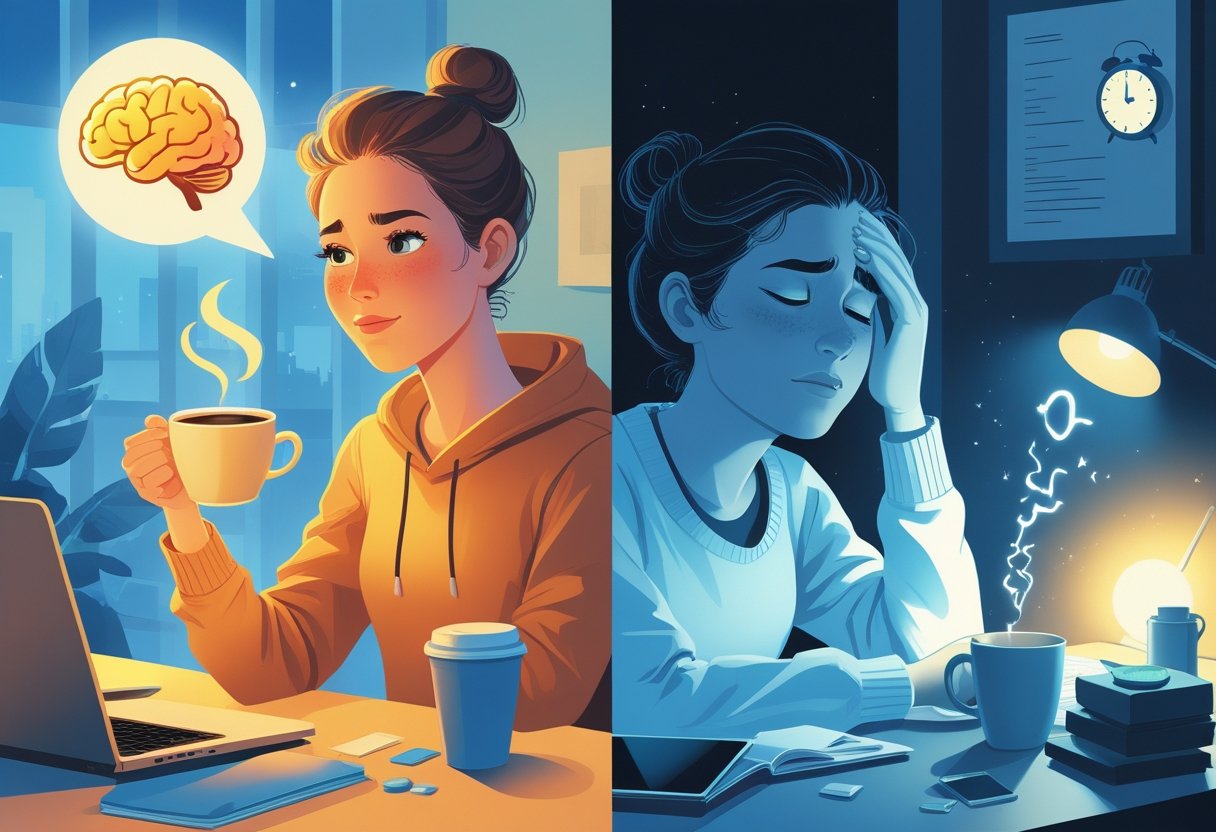
Coffee affects people in different ways. It can help with alertness and focus during the day, but it can also interfere with sleep and contribute to problems like insomnia. Knowing how it works can help people control their coffee habits.
Benefits of Coffee for Daytime Alertness
Caffeine in coffee blocks adenosine, a chemical in the brain that makes you feel tired. With adenosine blocked, people feel more awake. This can help with focus, reaction time, and energy levels. Coffee can lift mood and improve concentration. Many drink it in the morning or during long work hours to stay productive. Some notice it helps them keep a steady focus throughout the day.
Effects are different for everyone. Drinking 1–3 cups a day usually supports alertness without serious problems. Timing matters too. Having coffee earlier in the day reduces the chance it will disrupt sleep at night.
Risks of Poor Sleep Quality
Drinking caffeine too close to bedtime can make it hard to fall asleep and shorten sleep time. It can reduce deep sleep and REM sleep, both important for rest and memory. Sleep loss from caffeine can cause tiredness, slower thinking, and mood swings during the day. Over time, poor sleep can raise the risk of heart and metabolism issues.
Tolerance is personal. Some people feel tired after coffee because it disrupts sleep, triggers withdrawal, or causes a drop in energy when caffeine wears off. That explains why coffee can sometimes leave people feeling worn out.
Coffee and Sleep Disorders
Caffeine can worsen conditions like insomnia. It may make it harder to fall asleep, increase waking at night, and lower overall sleep quality. People with insomnia are more sensitive to caffeine. Even a small cup late in the day can increase restlessness and sleeplessness. This can create a loop where caffeine and poor sleep feed each other.
Caffeine can also affect sleep apnea in some cases by interfering with breathing during sleep. People with sleep problems should watch caffeine intake and avoid it in the hours before bed.
How Your Mattress Influences Sleep After Coffee
A good mattress is important in improving sleep quality, especially after caffeine consumption. Coffee can make it harder to fall asleep or stay asleep. A supportive mattress helps the body relax, which may ease the effects of caffeine on rest. Mattresses that offer proper spinal alignment and relieve pressure increase comfort. This lets a person fall asleep more easily even if caffeine is still in the system. A mattress that is too firm or too soft can cause discomfort and lower sleep quality.
Mattresses made with breathable materials create a cooler sleep environment. Caffeine can raise heart rate and body temperature, which can make falling asleep harder. A cooler mattress can help counter these effects and support better rest.
Key Mattress Features for Sleep After Coffee:
- Firmness Balance: Supports comfort and body alignment
- Breathable Materials: Helps regulate body temperature
- Motion Isolation: Reduces disturbance from movement
- Pressure Relief: Eases aches and promotes relaxation
For people who drink caffeine in the afternoon or evening, choosing a mattress with proper support and cooling can improve sleep. The Helix Midnight Luxe, for example, has zoned lumbar support, a breathable Tencel cover, and cooling technology. These features address common sleep issues caused by caffeine intake. The Helix Midnight Luxe also adapts to different sleep positions. Its multiple comfort layers provide support for both side and back sleepers. This makes it easier to stay comfortable throughout the night, even if caffeine keeps the body slightly alert.
The combination of lower caffeine impact and better mattress support leads to more refreshing sleep.

Frequently Asked Questions
Caffeine affects sleep by delaying sleep onset, reducing total sleep time, and lowering the quality of deep sleep. It can cause trouble falling asleep if consumed late, and its effects vary depending on the amount, timing, and individual differences. Managing intake and timing can reduce sleep disruption.

